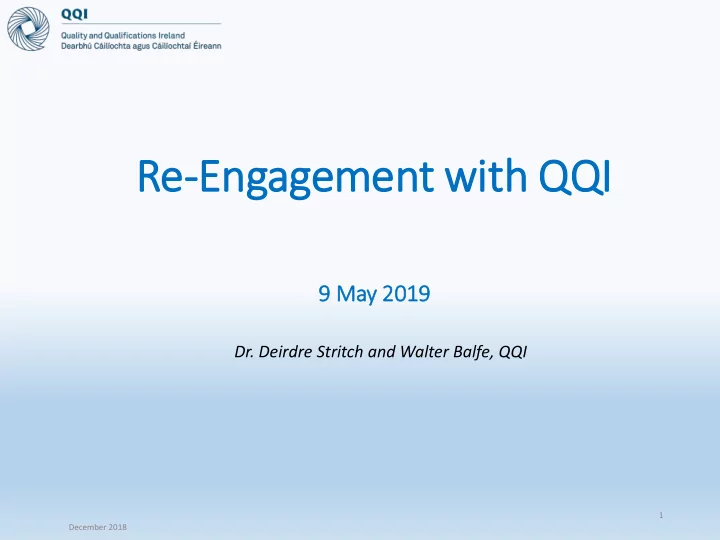

Re Re-Engagement wit ith QQI 9 9 May 20 2019 19 Dr. Deirdre Stritch and Walter Balfe, QQI 1 December 2018
Agenda • Overview of Reengagement and Application Process • Walter Balfe , Head of QA (QQI Awards) and Deirdre Stritch , QA Approval and Monitoring Manager QQI • Q&A • Preparing for Reengagement • Danny Brennan , Former Registrar of Letterkenny IoT and Reengagement Panel Chair; • Linda Coone , Head of Quality Assurance and Improvement at the National Learning Network (Rehab Group); and • Ruth Ní Bheoláin , Quality Assurance Officer, Hibernia College • Tea & Coffee • Peer Learning Activity - Facilitated Discussion with Panel • Wrap-up session and close 2
What is reengagement? Reengagement refers to the process by which QQI evaluates the QA procedures of providers whose programmes it already validates with a view to their approval or refusal. Provider QA procedures are evaluated for consistency with QA Guidelines issued by QQI and to ensure that they are fit-for-purpose in the context of the provider and its validated programmes. QA Guidelines relevant to ALL private and independent providers: • Core QA Guidelines • Sector-Specific Quality Assurance Guidelines for Independent/ Private Providers QA Guidelines relevant to some private and independent providers depending on the nature of their provision: • Topic-Specific Statutory Quality Assurance Guidelines for providers of Statutory Apprenticeship Programmes • Topic-Specific Quality Assurance Guidelines for providers of Research Degree Programmes • Topic Specific Quality Assurance Guidelines for Blended Learning QQI has identified a schedule for providers to complete the reengagement process. 3
Process Guide • https://www.qqi.ie/Articles/Pages/Reengagement- process-for-independent-and-private-providers.aspx 4
What does the process entail? Providers are asked to complete a gap analysis of their current QA policies and procedures against the relevant QQI QA Guidelines with a view to: • Doing a genuine assessment of their own situation based on own expertise and experience • Identify any potential areas of vulnerability – at provider or programme level • Amending and updating existing systems or putting new resources, policies and procedures in place to address any identified vulnerabilities and to drive enhancement Repeat as necessary until satisfied that all vulnerabilities and gaps have been addressed 5
What is expected of providers? QQI to get confidence that the provider has: • Done a genuine assessment of its own situation based on expertise and experience • Identified any potential areas of vulnerability – at provider level or programme level • Put resources, policies and procedures in place to address any identified vulnerabilities and to drive enhancement • Good governance in place – externality / independence/ devil’s advocate view at any area of significant decision making. Ways to avoid group think 6
What is the purpose of reengagement? QQI to get confidence that the provider has: • Clarity in policy and procedure o For learners o For staff o For other stakeholders and public o QA appropriate to Scope of Provision • Capacity to develop programmes capable of being validated and retaining validation • Separation of commercial and academic decision making 7
What must I demonstrate? 8
How do I apply? • Contact QQI when ready to apply and receive instructions on how to submit application • Submit application and related documentation via SharePoint • Pay fee 9
What happens in the process? • QQI screens application for completeness and general accuracy • This is not an evaluation • Panel appointed • at least 4 members plus report writer • Chair will be a current or former head of a HE or FE institution • Will have representation from private sector • Will have QA expert and other specialist area expertise where relevant • Conflict of interest and confidentiality • Panel planning meeting • Introductions • Overview of Process • Confirm agenda • Identify additional information / clarifications required • Site visit • Draft report • Verification check • Provider response • Report finalised • Submitted to PAEC • Outcome confirmed to provider and panel • Access to appeal process 10
Draft Agenda HE 11
Draft Agenda FE 12
Possible Outcomes 13
Mandatory Changes and Specific Advic ices Mandatory Changes: • those areas that absolutely must be addressed in order for the provider’s QA procedures to be approved. • Only identified in the second category of outcomes - refusal to approve with six months in which to make changes • When changes made, original Panel (to the extent possible) is reconvened to determine whether changes have been made satisfactorily after which QA procedures are either approved or refused • New section added to end of original report to record the overall outcome Specific Advices: • “Recommendations” in the old money. Suggestions for improvement that the Panel advice would be beneficial, but which are not binding. • Can be set out in either an approval or refusal with mandatory changes March 2017 14
General Advice on Completing Application • Effort expended by providers very worthwhile but needs to be channelled • Make it for you and colleagues rather than QQI • Application documents need to be ‘audience aware’ • Panel experience can be very useful • Templates for policy and procedure • Diagrams and presentation of QA • Self-assess 15
Resources For templates and Guide to Process see QQI Webpage on Reengagement See Application Schedule and QA Approval Reports 16
Recommend
More recommend